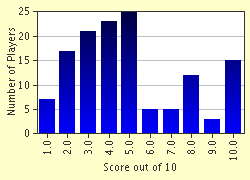Quiz Answer Key and Fun Facts
1. One of the most important philosophers of the 20th century was undoubtedly a certain Professor Quine of Harvard University. What are the first initials of Professor Quine, who started teaching at Harvard in 1936?
2. The second longest reigning emperor in Chinese history was Qianlong, a sovereign of the Manchu Qing Dynasty. During which of the following 60-year periods did Qianlong reign supreme over China?
3. In the 16th century, a Sephardic Jewish mystic and philosopher created a code of Jewish law that was prevalent amongst the community for several centuries. What was the surname of this great intellect?
4. The Belgian intellect Adolphe Quetelet, who lived from 1796 to 1874, is often considered to be the father of which of these disciplines?
5. Quintilian was a Roman intellect of some stature during the 1st century A.D. His main contribution to humanity was in the form of a 12-volume compendium on the topic of rhetoric. What is this, his only surviving work, called?
6. One of the great emperors in Chinese history, Qin Shi Huang Di is largely given credit as the first emperor of a united China. Before taking the reign title 'Qin Shi Huang Di', what was the name of this giant of Chinese history?
7. An economist of the 18th century and founding father of the French school of physiocrats, he greatly influenced the works of Adam Smith with his ideas on free trade and natural law of economy. What was the name of this influential Frenchman?
8. Perhaps the work most influential in making the English speaking public aware of the concept of drug addiction was one by English essayist Thomas de Quincey, called 'Confessions of an English __________'. (Finish the title by choosing the word that fits the blank.)
9. One of the greatest and most influential poets of Chinese history was Qu Yuan, who lived from 339 to 278 B.C. What was Qu Yuan's greatest work of poetry called?
10. Manuel Quezon was a law student and revolutionary, who later became the first president of his newly formed country. Of which country was he elected president in 1935?
Source: Author
thejazzkickazz
This quiz was reviewed by our editing team before going online.
Any errors found in FunTrivia content are routinely corrected through our feedback system.

